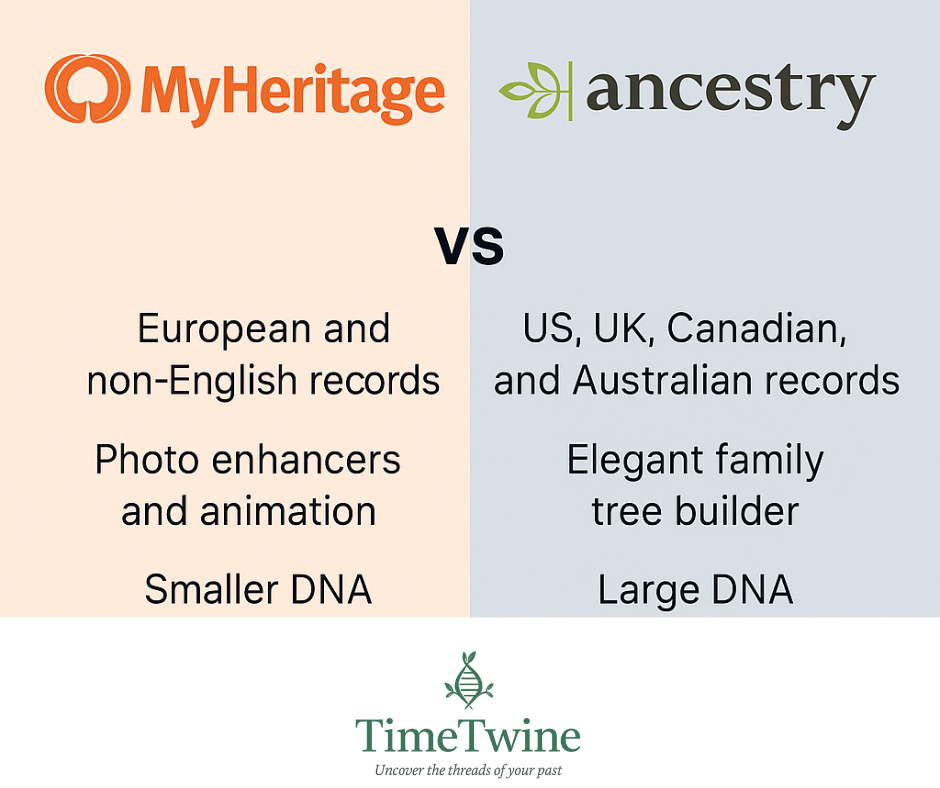Ancestry versus MyHeritage
- Jo
- Jul 6, 2025
- 3 min read
Updated: Jul 11, 2025
Choosing the Right Family History Platform for Your Journey?

When you decide to embark on the journey of exploring your family history, two names often come up: MyHeritage and Ancestry. Both are powerful tools for discovering your roots, but they offer slightly different experiences and strengths. Here’s a closer look to help you decide which might suit your journey best.
🌿 The Basics: An Overview of Features and Offerings
Both MyHeritage and Ancestry allow you to:
Build and grow your family tree.
Search historical records and digitised archives.
Connect with distant relatives to grow your family story.
Upload and analyse DNA for ethnicity estimates and DNA matches.
However, there are some key differences in their features and focus.
🗂️ Historical Records: Depth vs Breadth
Ancestry has one of the largest collections of historical records in the world, with over 30 billion records. It’s particularly strong in the US, UK, Canadian, and Australian archives, making it ideal if your ancestors spent time in those countries. Their record categories include census data, military records, immigration documents, and vital records, providing a comprehensive overview of familial connections.
MyHeritage, while smaller, excels in providing access to European and non-English records. It features exclusive collections from countries such as Norway, the Netherlands, and various Eastern European nations and even provides digitised newspapers in multiple languages.
Tip: If your heritage traces back to Europe, MyHeritage may uncover records that Ancestry doesn’t have.
🧬 DNA Testing: How They Compare
AncestryDNA is one of the largest consumer DNA databases globally, significantly enhancing your chances of connecting with relatives across the globe. Their ethnicity estimates are detailed, and they focus on regions in North America and the British Isles.
MyHeritage DNA has a smaller database but a stronger presence in Europe and Israel, which can be a benefit for those researching Jewish ancestry or European connections. It also offers powerful chromosome browsers and auto-clustering tools for DNA matches, ideal for more advanced users.
🌐 User Interface & Tools: Navigating Your Research
Ancestry is noted for its intuitive user interface, characterised by a polished family tree builder and an effective hints system denoted by enticing green leaves, suggesting potential connections based on your input. Their mobile application is user-friendly, allowing seamless navigation and discovery on the go
MyHeritage differentiates itself by offering innovative features such as the Photo Enhancer and Deep Nostalgia tools. These capabilities not only enhance photographic quality but also animate historical family images, bringing your discoveries to life in a captivating way.
💵 Cost: Subscription Plans
Both platforms offer free accounts, but to access their full range of records, you’ll need a subscription:
Ancestry subscriptions are slightly more expensive, especially if you want access to international records.
MyHeritage offers more affordable options and often runs discounts, but some key features like DNA tools are part of premium plans.
🧵 Deciding Which Platform is Right for You?
Consider the following when making your decision:
Choose Ancestry if:
✅ Your family has strong ties to the United States, the United Kingdom, or Australia.
✅ You want a large pool of DNA matches.
✅ You prefer a polished, beginner-friendly experience.
Choose MyHeritage if:
✅ You’re researching European or Jewish roots.
✅ You love tech tools for enhancing photos and analysing DNA.
✅ You want a slightly more affordable subscription.
🪡 We Can Help You Weave It Together
At TimeTwine, we work across both platforms to ensure you get the best of both worlds. Whether you’re unsure where to start, need help interpreting DNA results, or want us to search records on your behalf, we can guide you every step of the way.
Curious about your family’s story? Let us help you uncover the threads of your past.





Comments